A Hard Pill to Swallow: How The Umbrella Academy Depicts Prescription Medication
A look at Season 1 of The Umbrella Academy before Season 2 premieres!
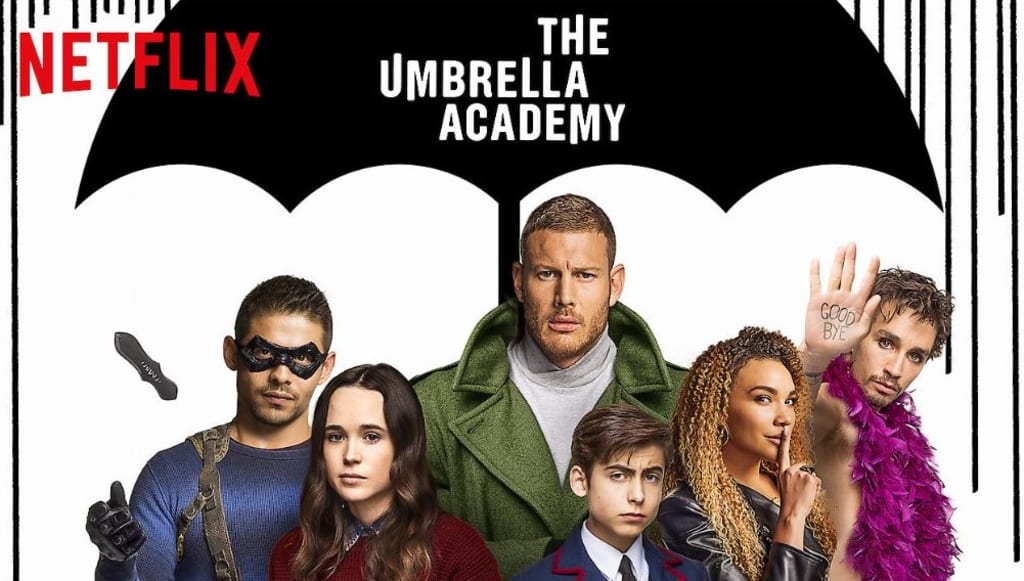
I had mixed feelings when I first learned that The Umbrella Academy would be coming back to Nextflix on July 31st. On one hand, I remembered how excited I was when I first read the series’ description. A superhero show inspired by Gerard Way’s comic book series sounded like Netflix snuck into my brain to fuse my love of superheroes with my love of angsty 2000s pop-rock. I expected something fun and fast-paced. I hoped for beautifully choreographed fight scenes set to a killer soundtrack. And Netflix delivered. I could watch superheroes foil a bank robbery with Fitz and The Tantrums playing in the background all day.
In addition to the fun visuals and a newly favorited album on Spotify, The Umbrella Academy gave me something I didn’t even know I wanted in a tv show—a character with mental illness who takes a prescription medication onscreen.
From 13 Reasons Why’s Hannah Baker to the title character of Jessica Jones, media including characters with mental illness are on the rise. However, in these examples, neither character addresses their struggles through therapy, let alone any prescription medication. The first season of 13 Reasons Why shows the challenges of coping with undiagnosed depression while Jessica Jones gives countless examples of using alcohol as a coping mechanism for PTSD. Of course, I have appreciated seeing characters with mental illness showcased onscreen. That said, I had never seen a character begin a narrative with a head start on addressing their mental health.
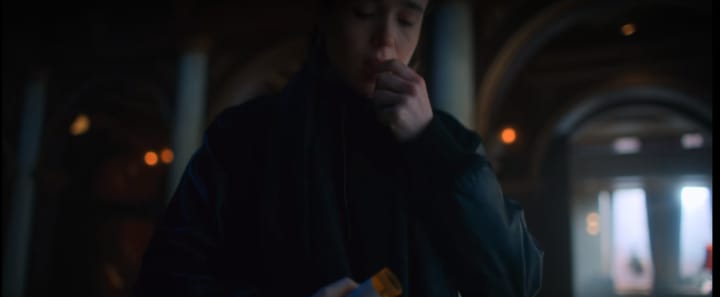
When I first saw Vanya Hargreeves take a pill from a prescription bottle after a fight breaks out at her father’s funeral, I was awestruck. Yes, Vanya takes prescription medication, but her response to the stress of a tumultuous family reunion isn’t a cry for help. She doesn’t take medication in excess or attempt to numb herself with alcohol. Instead, she takes one pill from a prescription bottle. Her approach is measured and ordinary. In the second episode, she even tells one of her brothers that she “used to see someone, a therapist.” In an age where mental health is so stigmatized, I respected The Umbrella Academy for showing a character with a mental illness who recognizes her triggers and willingly takes prescription medication.
I’d seen characters go through therapy and start to take medication, but I’d never started a story with a character whose mental health struggles were in the past tense. I have seen mental health be the conflict—I hadn’t seen mental health issues tackled and as a daily part of someone’s life until The Umbrella Academy. I felt just like Big Mouth’s Jay Bilzerian when he found a show about a magician exploring his sexuality. The integration of superheroes, songs by Gerard Way, and a discussion of mental health really felt like “Netflix [had] so much money, they made a show just for me!”

Though I’d fallen in love with the way the show normalized the act of taking psychiatric medication, I became skeptical when Vanya abruptly stopped taking it. In the fourth episode, Vanya finds herself without her prescription. For the first time in the series, she clarifies that she “[needs] it for [her] nerves” and that she has “been taking it since [she] was a kid.” Although Vanya never uses clinical terminology, this timeline suggests that she may take her medication for an anxiety disorder that she has experienced since childhood.
Vanya may only cite her “nerves” in one scene, but The Umbrella Academy shows the audience multiple examples of Vanya’s anxious behavior. For example, the first three instances of Vanya taking her medication coincide with stressful situations. She reaches for her prescription bottle after witnessing a fight at her father’s funeral, when one of her brothers tells her that the world is going to end, and when the first chair of her orchestra suggests that Vanya doesn’t have the “something special” that makes a great violinist.
While the first two examples are unquestionably stressful, the third makes more sense after knowing Vanya’s history. Sir Reginald Hargreeves adopted Vanya and her other siblings after a mysterious event occurred where several women who hadn’t been pregnant spontaneously give birth around the world. Though the children had different mothers, they share a birthday and all of them (except Vanya) develop superpowers in their youth. Describing her childhood in her autobiography, Vanya recounts that her father “never missed an opportunity to tell [her that she] was ordinary—a fact that was a hard thing for a little girl to hear.” Such dismissal from her father would be painful by itself. However, when paired with the fact that Vanya grows up with six unquestionably remarkable children, Hargreeves’ consistent reminders that Vanya is not special would be devastating. Having the first chair repeat that she lacks “something special” becomes more than a rude comment from a colleague. It morphs into a reminder of Vanya’s traumatic childhood and encourages her to reach for her prescription.
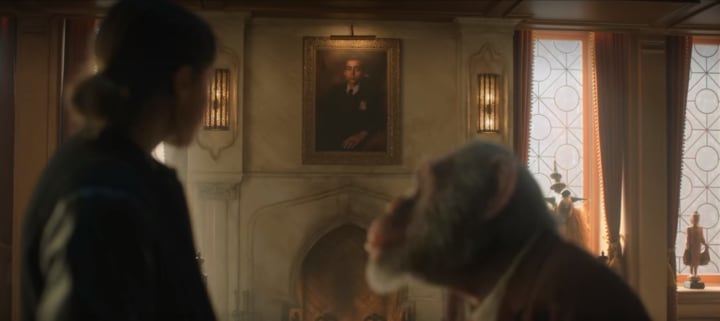
The Umbrella Academy includes additional scenes in which Vanya showcases anxious behavior to complement this prescription usage. When recalling the disappearance of one of her brothers, Vanya and Pogo (the family butler) discuss Vanya’s many attempts to prepare for Number Five’s potential return. She remembers “always” leaving the lights on for him because she was “scared that he would come back, it would be late and the house would be dark and he wouldn’t be able to find [his family] and would leave again.” While the disappearance of a brother would be painful for anyone, Vanya is the only one of her siblings to showcase compulsive behavior as a response to this trauma. Five’s disappearance triggers a persistent worry for Vanya (that Five would leave again) and she explains a repeated behavior that soothed her anxiety. Though Vanya doesn’t clarify how long she persisted in this behavior, her use of “always” suggests it was a frequent occurrence.
In addition to leaving on the lights, Pogo notes that Vanya left out Five’s favorite sandwiches (peanut butter and marshmallow) frequently enough for Pogo to remember stepping in many of them. While leaving the lights on would realistically help Five find his family, Vanya’s sandwich-making is a less practical action. The Hargreeves family lived in a giant, well-stocked mansion. Even if he returned home hungry, Five would have ample access to food. Furthermore, Five disappeared at the age of fifteen. There is no apparent reason for Vanya to assume that even a famished Five couldn’t feed himself. Leaving peanut butter and marshmallow sandwiches around the house becomes more of a ritualistic than helpful behavior. It’s an action that is tailored to Five and helps reassure Vanya that her brother would know he was missed if he returned. This short scene provides two examples of Vanya engaging in compulsive behaviors to cope with the anxiety of losing a family member. In conjunction with her mention of her “nerves,” these behaviors suggest that Vanya’s prescription is likely linked to a form of anxiety.
So, when Vanya’s boyfriend Leonard casually suggests that she can survive without her medication for a day, I anticipated a few repercussions. It would be one thing if we saw a professional suggest that Vanya taper off her medication. Psychiatric medications can be used for a specific period of time when someone is undergoing a particularly high level of stress. If someone has adequate support through therapy or their life circumstances have changed, they may no longer need medication and may wean themselves off of it. However, the suggestion for Vanya to go off her medication doesn’t come from a professional. It comes from Leonard, who seems to think that going off her medication isn’t a big deal. There is no discussion of possible consequences, whether they be an increase in Vanya’s anxiousness or a form of withdrawal. Given that this decision seemed to be a matter of convenience with no real thought regarding how it might affect Vanya's mental health, I expected the casual decision to have a notable impact. I imagined her reaching for a pill bottle that wasn’t there, exhibiting some symptoms of anxiety, and her anxiety possibly escalating to a panic attack. I did not expect the words, “Well, honestly, I feel the best I have felt in a long time.”
Where I expected to see a relapse, Vanya gets stronger. The removal of her medication precedes two massive achievements in Vanya’s life. First, she auditions and gains the coveted role of first chair violinist in her orchestra. Second, and more notably, Vanya discovers that she has superpowers. At first, The Umbrella Academy subtly suggests the reveal of Vanya’s latent powers when she plays her violin. During the audition, the audience sees a magical wind blow past the judges as Vanya plays. Vanya even describes the sensation she felt as being “carried along by an invisible force.”

Vanya’s true power becomes clearer once she becomes angry with her family. Fuming after learning that she has been excluded from another family meeting due to her apparent lack of superpowers, Vanya vents to Leonard as she storms down the street. In her fit of rage, rain begins to pour, lampposts bend toward her, and car alarms start blaring. Leonard notices how Vanya’s fury affects her surroundings and, when she denies his assumption, the rain momentarily stops. Finally, Vanya realizes the truth: after a lifetime of feeling ordinary, she discovers that she has telekinetic powers linked to her emotions.
Given that Vanya only unlocks her superhuman abilities after she stops taking her medication, this becomes the story of a woman who gets better after she stops taking her pills. While this makes for an exciting reveal of Vanya’s powers, it contradicts an otherwise well-established story of her struggle with anxiety. The Umbrella Academy sets up a narrative where a character exhibits anxious behaviors, takes a prescription medication “for nerves” after stressful situations, and cites having gone to therapy. The series highly suggests that Vanya struggles with anxiety and uses her prescription to help her with these struggles. However, despite these hints throughout the series, the return of Vanya’s powers after she stops taking her medication suggests that, regardless of any mental health concerns, she becomes more capable without her medication.
This idea that prescription medication robs people of their “power” counters the findings of several clinicians and organizations dedicated to mental health. Dr. Alex Dimitriu of Menlo Park Psychiatry & Sleep Medicine directly addresses this issue in his writings on “Overcoming the Stigma of Psychiatric Medication.” Dimitriu counters the concern that a psychiatric medication could “change [someone’s] personality, dull [their] senses, turn [them] into a zombie” to claim that “There is nothing more destructive to a person’s sense of self, to the unique characteristics that define a personality than a mental illness.” He argues that while mental illness can “sap energy and impair functioning,” prescription medications can alleviate these symptoms. Although Dimitriu notes that some psychiatric medications have side effects, he focuses on the fact that these medications aim to improve someone’s daily life if it has been negatively affected by mental illness.
The Canadian Mental Health Association also seeks to debunk this myth in their article “Myths about Antidepressants” from the Visions journal issue on medications. The article notes that people may fear taking “psychotropic medication (medication for mental illness) because they feel anything affecting the brain—the very heart of our humanity—may interfere with their identity and feelings.” However, the Canadian Mental Health Association argues that the opposite is true because “antidepressants are designed to return you to your former demeanour [sic] or personality, not create a different one.” In these ways, both Dimitriu and the Canadian Mental Health Association suggest that psychiatric medications aim to improve someone’s life by making them more effective.
However, The Umbrella Academy depicts prescription medication in the opposite light. Instead of helping her, Vanya’s medication makes her life more difficult. While on the medication, Vanya struggles with playing certain pieces on her violin. She has a seat in her orchestra but, as noted by the former first chair, she lacks the “something special” to allow her to progress. Yet, as soon as she goes off her medication, she performs her audition piece beautifully and gains the previously unobtainable title of first chair. Similarly, her medication dulls Vanya’s innate powers. Appearing to be the only one of her siblings without superpowers had the twofold effect of making Vanya feel inferior and prevented her from having close relationships with her family. Although mental health specialists like Dr. Dimitriu and the Canadian Mental Health Association explain that psychiatric medications aim to make someone’s life more manageable, Vanya’s medication makes her life harder. Dimitriu also notes that “millions of people still fail to get the help they need because of the stigma around the medication that can alleviate their suffering.” Depictions of psychiatric medication that detract from someone’s life rather than improve it suggest that this medication is not a helpful tool and may discourage those who could benefit from medication from exploring it as an option.

The Umbrella Academy takes this harmful depiction of prescription medication another step further when the audience learns the original motivation for Vanya’s medication. In a series of flashbacks narrated through Hargreeves’ journal, the audience learns that Vanya’s superpowers manifested in childhood. During a private training session, Hargreeves encourages Vanya to focus on the sound of a tuning fork so she can focus her powers. When she becomes distracted, Hargreeves yells that her “insolence is unacceptable!” Vanya’s emotions during this confrontation make her lose focus further, causing her powers to explode a set of water glasses and Hargreeves’ monocle. The shattered monocle cuts Hargreeves’ cheek and he prematurely ends Vanya’s training. The next flashback involves Hargreeves locking Vanya in a soundproof chamber to contain her and her powers, claiming that “More research is required to determine if [her] behavior can be regulated.”
Notably, the decision to stop Vanya’s training revolves more around Hargreeves’ emotions than Vanya’s. Although Vanya appears surprised when she accidentally shatters the glasses, we don’t see her show any symptoms of anxiety after this happens. She doesn’t start hyperventilating and she doesn’t appear to ruminate on the event. She merely tells her father that it was an accident—a shockingly normal response. Hargreeves, on the other hand, is more affected by the incident. He prematurely stops training and locks Vanya in a soundproof chamber away from her siblings.
It seems likely that other children could have injured people during their training (Diego’s weapons of choice are throwing knives after all) but Vanya is the only one Hargreeves isolates in this way. The phrasing of Hargreeves’ justification for isolating Vanya suggests he fears more than her powers alone. While Hargreeves could have suggested that more research would be required to determine if Vanya could regulate her powers, he instead uses the passive voice. The unspoken regulator of Vanya’s powers appears to be Hargreeves, rather than his adopted daughter. This phrasing denies Vanya autonomy and suggests that Hargreeves finds her powers problematic because he cannot control them through Vanya.
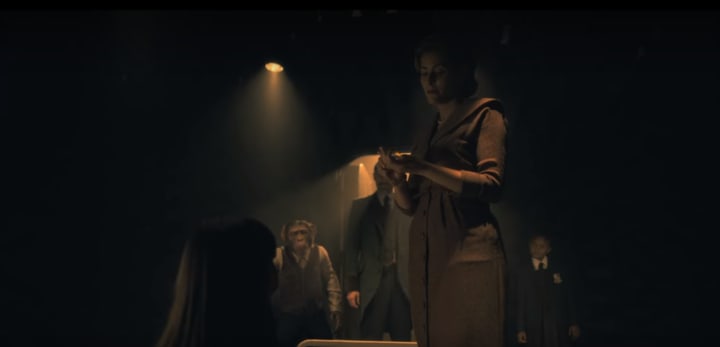
Once Hargreeves decides that Vanya remains outside of his control, he uses Allison to erase Vanya’s memory of her powers. Allison’s power is the ability to change reality; if she prefaces a sentence with “I heard a rumor,” anything that follows becomes true. When both girls are four years old, Hargreeves asks Allison to create the rumor that Vanya thinks she’s ordinary. Immediately after Allison creates this rumor, Grace (an android who acts as the children’s mother figure) encourages Vanya “to take [her] medicine like a good girl” because “It’ll help calm [her] nerves.”
Here, Grace introduces the idea that Vanya may be anxious even though “nerves” have nothing to do with Hargreeves’ decision to medicate Vanya. The correlation between the medication and Vanya’s supposed nerves seems to suggest that Hargreeves prescribed it to Vanya to help her. Ironically, it is actually Hargreeves’ nervousness surrounding the inability to direct Vanya’s power that inspires him to medicate her. When Vanya fails to fit the model of Hargreeves’ ideal Umbrella Academy (a team of superpowered children whom he can direct) he removes her powers completely. It appears easier for Hargreeves to remove Vanya’s powers than for him to help her learn to use them properly. The rationale for Vanya’s medication isn’t to make Vanya’s life easier, but her father’s.
What I take issue with here is the incongruity with which The Umbrella Academy portrays Vanya’s medication. The series dedicates substantial screen time to showing Vanya’s anxious behaviors. It even mentions Vanya’s “nerves” as the reason for her medication. Then, it completely contradicts that entire narrative by suggesting that the original reason for the medication had nothing to do with Vanya’s anxiety. The jarring transition from Vanya’s medication acting as a prescribed method for alleviating anxiety to an enforced medication used to make her powerless suggests that these types of medications are more restricting than they are helpful. Vanya’s powerless and medicated state makes life easier for Hargreeves. Taking this one step further, one might conclude that The Umbrella Academy suggests that prescription medications are merely tools to make those struggling with their mental health more palatable to those around them. Again, this depiction directly contradicts the reason doctors prescribe psychiatric medication to any patient. In Dr. Dimitriu’s words, “Psychiatric medication has helped countless people reclaim their lives.” The events leading up to Vanya’s initial prescription suggest that the medication helps Hargreeves claim Vanya’s life, rather than Vanya reclaiming her own. In doing so, The Umbrella Academy reiterates the theme of medications being more harmful than helpful, which is a dangerous stereotype for those who could benefit from psychiatric medication.
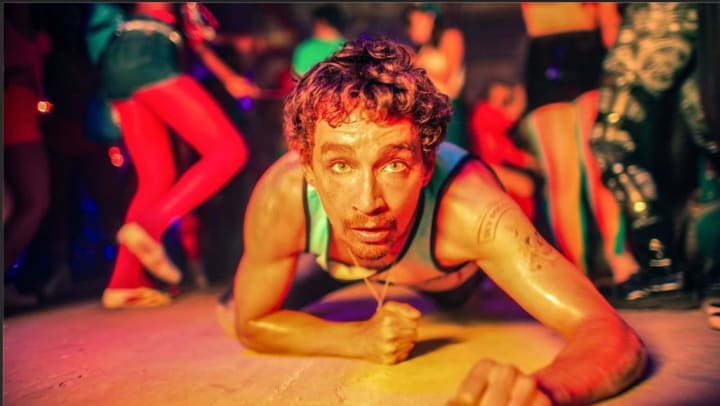
Further complicating this troubling depiction, Vanya’s prescription medication use bears a striking resemblance to Klaus’ drug abuse. When the audience first meets Klaus, he is leaving a rehabilitation center. The desk attendant’s bored promise of “We’ll see you soon, Klaus” suggests this is not the first time he’s left rehab only to return soon after. In fact, the next shot of Klaus involves him picking up a small plastic bag from a dealer and then being revived in an ambulance after his overdose. These first few moments of screen time initially establish Klaus’ struggles with addiction, and these only escalate as the series continues. Klaus drinks, smokes, and, in one scene, even chases down a stay pill on the ground at a rave.
Obviously, Klaus and Vanya have very different relationships with medication here. Klaus self-medicates with random assortments of drugs while Vanya calmly takes a prescription medication that belongs to her. Klaus is an addict constantly chasing a high while Vanya’s medication use is incredibly measured. The audience never sees Vanya take her medication in excess. In fact, a brief shot of the prescription label clarifies that her dosage is two daily. This dosage perfectly aligns with shots of Vanya taking her medication and suggests that she takes only the recommended amount of her medication.
Despite the vast difference between Klaus’ addictive behavior and Vanya’s use of prescription medication, their narratives have a lot in common. For one, Klaus’ drug use has the same effect as Vanya’s prescription—it dulls his powers. Klaus’ power is that he can see and communicate with the dead. The audience first sees Klaus’ power manifest when he talks to his dead brother, Ben. However, it becomes clear that Klaus doesn’t have full control over his powers and that the voices of the dead can feel assaulting. When Klaus is captured and tortured, he forcibly goes through withdrawal and begins to see the former victims of his captors. What starts with one woman mumbling in Russian turns into a full room of bloody victims explaining to Klaus how they were tortured and killed. The victims’ voices become overwhelming and Klaus complains that they are “worse than the drugs” while telling them to shut up. While Klaus is undergoing this forced withdrawal, Ben even remarks that Klaus hasn’t “been this sober since [he was] a teenager,” suggesting that he has been abusing substances for years in an attempt to self-manage the trauma associated with his superpower.
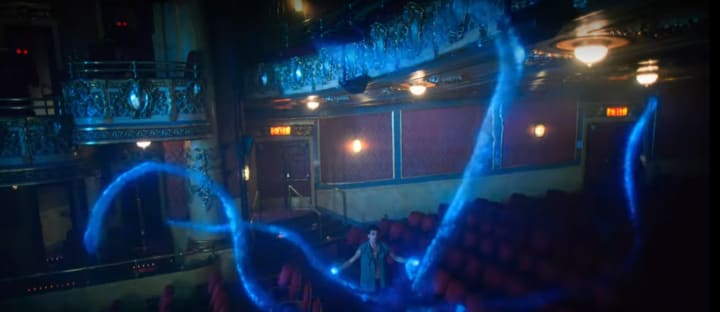
Not only does Klaus experience the same numbing effect with drugs that Vanya has with her prescription medication, but both characters become more capable after they stop using these substances. While high, Klaus is the only one who can see or talk to Ben. Ben acts as an observer who can do nothing more than hope Klaus listens to him. However, as Klaus continues to stay sober, he begins to be able to physically manifest Ben. When Klaus attempts to relapse, Ben successfully punches the pills out of Klaus’ mouth. This surprises both characters, suggesting that this is the first time Klaus has been able to manifest Ben to the point where he can make an impact on his surroundings. Klaus continues his sobriety and, in an ultimate show of his true capability, he manifests Ben so successfully that a visible Ben can use his powers to protect the Hargreeves family from multiple assailants. Like Vanya, Klaus’ powers are all but invisible until he removes the substances interfering with them. As soon as these substances no longer "interfere," he becomes a much more valuable member of the Umbrella Academy team.
I’m an absolute sucker for parallel structure, but treating Vanya and Klaus as foils in this regard deeply disturbed me. There is a vast difference between substance abuse and taking prescription medication. As shown by his brief trip in the ambulance, Klaus’ substance abuse routinely puts him in danger. He indiscriminately chases highs to help him cope with the pain that his power causes him. Prescription medication, on the other hand, is designed to be a regulated way to help someone function efficiently. Vanya’s controlled medication dosage should help her cope with her anxiety with minimal side effects. Yet the similarity between Klaus’s sobriety and the removal of Vanya’s medication suggests that any substance, self-medicated or prescribed by a professional, dulls one’s “true power.” While that argument works for characters working toward sobriety (like Klaus), it doesn’t necessarily work for characters with mental health issues (arguably like Vanya). It again feeds into the narrative that prescription medication will “turn someone into a zombie” or make them a shell of their former selves instead of helping them.
I would like to contrast this with another representation of anxiety medication—that in the CW’s Crazy Ex-Girlfriend. Much like with Vanya, the audience witnesses protagonist Rebecca Bunch reaching for her prescription in a time of crisis in the first episode of the series. After receiving a promotion but still not feeling happy with her life, Rebecca desperately riffles through her purse to find her anxiety medication. Later, when she erroneously thinks that moving to be closer to an ex-boyfriend will dissolve her problems, she crushes the medication in her garbage disposal. Unlike Vanya, Rebecca does not become stronger or clearer in who she is once she stops taking her medication. In fact, it takes Rebecca several seasons, multiple therapists, and, eventually, a prescription medication to help her refine her own “power” so to speak. Although Rebecca never develops literal superpowers, the series finale shows her embracing her true passion—songwriting. Crazy Ex-Girlfriend features countless musical numbers, which are imagined scenarios that act as metaphors to help Rebecca understand the world around her. In the series finale, the audience learns that although Rebecca is passionate about music, she has never done anything with her talents. With encouragement from her best friend, Rebecca pursues songwriting and embraces her own “superpower.”

Notably, prescription medication becomes a key feature of Rebecca’s mental health journey that eventually allows her to pursue her passion. In the number “Anti-Depressants Are So Not a Big Deal,” Rebecca imagines a La La Land-inspired performance starring people who take antidepressants. Toward the end of the song, Dr. Akopian gives Rebecca a large prescription bottle with tap shoes inside. Although Rebecca previously danced in sneakers, the tap shoes from the prescription bottle allow her to lead the rest of the company in a full tap routine. The tap shoes metaphor showcases antidepressants as a tool to help someone become more effective. Although Rebecca can dance before her doctor gives her the metaphorical prescription, the tap shoes help her lead the dancers in a way she previously couldn’t. While Vanya becomes less inhibited once she is off her medication, Rebecca imagines her prescription as a tool that allows her to perform the way she wants. This much more clearly illustrates that prescription medications are designed to help, rather than hinder, the person taking them. Even with the musical numbers, Crazy Ex-Girlfriend offers a more realistic depiction of how doctors prescribe psychiatric medications to help people become more effective versions of themselves.
While this number clearly celebrates prescription medication as a helpful tool, it also recognizes potential side effects. Chorus members in the song lament weight gain and erectile dysfunction as side effects they suffer while taking antidepressants. Other chorus members offer hope with comments like “Oh, that totally happened to me! It got better within a few months,” but the song still recognizes that these medications aren’t perfect. Rebecca is arguably the best example of this, as she suffers relentless fatigue once she starts the medication her doctor prescribes. For an entire episode, Rebecca yawns constantly and even falls asleep during a mission to help her friend take the bar exam. While the medication ultimately helps Rebecca, Crazy Ex-Girlfriend doesn’t pretend that prescription medication is an easy, one-size-fits-all solution. It offers a balanced depiction of the pros and cons of prescription medication in a way that I wish The Umbrella Academy had.
Do I still consider myself a fan of The Umbrella Academy? Of course. Do I have July 31st marked on my calendar to watch the new season? You bet. That said, I hope The Umbrella Academy takes a page from Crazy-Ex Girlfriend’s songbook in the coming episodes. Crazy Ex-Girlfriend plays the repeated line “the situation's a lot more nuanced than that!” for laughs, but treating mental health with prescription medications is nuanced. There can be side-effects and backslides, but there is also the possibility for someone to live a happier life. I don’t know how The Umbrella Academy will progress, but I would love to see a more nuanced look at Vanya’s anxiety in the coming season.
About the Creator
Jamie Lutz
I'm a New York-based word nerd with a passion for media writing. I love writing about superheroes, literature, and all the nerdy things in between!






Comments
There are no comments for this story
Be the first to respond and start the conversation.